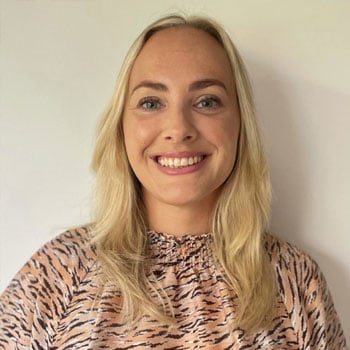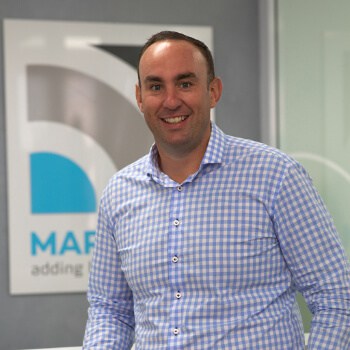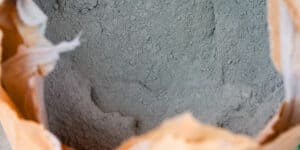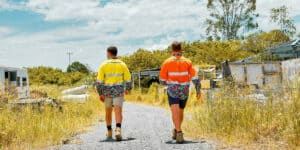HAYDEN: Hello and welcome back everyone, to the MARKHAM podcast – Invisible Strength, Next Level! I’m Hayden Prestidge, sales and marketing team leader for MARKHAM across Australia and New Zealand. And today, we’ve asked Laura Gemmell to join us for a chat. And this is a topic we’re very passionate about.
It’s all about the environment, and environmental impacts. And MARKHAM are on a journey, as you would know from listening to these podcasts, for us to really reduce that amount of concrete being produced in coming years; and with that our intent to add life to concrete, we can achieve that result. So this… the environment does need to be thought about and hence this session right now.
So Laura is currently Chief Executive of Eco Choice Aotearoa, formerly known as Environmental Choice New Zealand; and she has had a huge array of roles and history; of public, very public-facing roles, which is fantastic. So we’ll hear more about that, but most recently Laura has worked over 10 years in World Vision in situations around the globe. So welcome. Laura, tell us about yourself. How’s things going on?
LAURA: Thanks so much, Hayden. Yes, I’ve been with Eco Choice Aotearoa for just over a year now. And prior to that I came from… I guess when we look at sustainability as a scale and you have environment at one end and you have social at the other, I was predominantly focused on the social end, working with communities, and some of the most hardest hit areas by climate change; affected by war and things like that around the globe. And I guess when I started to see more and more was how the climate and biodiversity crises were really undermining our efforts – so if it was long term sustainable development, for instance – in the community where we were looking at drainage, economic development, all of those sorts of things, education, health.
You know, it only took a typhoon to roll in and wipe, you know, 20 years of work away. And it was the same in war zones. You know, you would see people that were fighting over increasingly scarce resources.
So more and more, I sort of started to turn my attention into looking at the environmental factors; which led me down a path, and I, yes, arrived at Eco Choice last year. So it’s been a journey, but it’s been a really exciting one. And it’s so great to work with companies like MARKHAM, on reducing environmental impact; but I guess offering a level of assurance to consumers, whether they’re B2C or B2B, that I think no one else does.
So, you know, we look at the environmental impacts; increasingly social responsibility, you know, whether a product is safe for families and their homes; and whether it’s, you know, fit for purpose, does it work? does it do the job? So yes, something a bit different, but really exciting and it just feels like more relevant than ever, to be honest. Critical.
HAYDEN: No, it’s good, good overview; and it’s good you touched on the social aspect as well because we often overlook that as part of this impact. So it’s good, good range of skills there. So thanks for all you’ve been doing.
So basically to kick off, you’ve touched on it briefly then, but what is the recent rebrand of Environmental Choice to Eco Choice? and tell us a bit about that, and what is the organisation all about? Why it matters, etc.
LAURA: Sure. Well, Environmental Choice New Zealand had been around for 30 years, but still the same outfit. We’ve just had a little bit of a brand refresh, I guess. So we’ve been around for 30 years.
The Ministry for the Environment in New Zealand owns our trademark, but we have an independent board; and I like to say that we operate without fear or favour. We certify products and services that as I mentioned are, you know, environmentally preferable, socially preferable, for purpose, and safe. And we do this by sort of creating product standards.
We often will look around, we’re part of the global eco labelling networks. We’ll look to see what’s being done in other countries first, but obviously New Zealand is a very unique country at the bottom of the world. So we have some particular challenges that we need to take into account and look at commercial viability – feasibility rather. So we create our standards and then we audit businesses and their products against those standards. We do that annually; and bi-annually we do a site audit as well, which is actually quite unique in terms of the eco labelling, I suppose, ecosystem.
So yes, we’ve been around for 30 years. We’ve recently, very recently in fact, rebranded to Eco Choice Aotearoa and that is to… It’s been a journey. We’ve been working on it for about a year; and look, we started with names that were really, you know, out of left field, those sorts of things; and came, you know, full circle back. Because at the end of the day, when we talk about ‘eco’, we mean we’re sort of alluding to the wider ecosystem; and treating the social elements and the environmental elements as separate.
We can’t do that any longer, because we need everyone on board, everyone doing their part. And for instance, if you are a single parent who is struggling to make ends meet and keep a roof over your head and feed your children, the last thing you’re going to do is pay that little bit extra for something that’s sustainable; or even have the brain space to be able to make those sorts of decisions.
So it’s imperative that we look at what ways we can tackle both issues at the same time rather than continuing to be in these silos. So I guess going forward we’re very much going to have more of a people and planet focus.
And ‘Aotearoa’ – we decided to use the Aotearoa name for our country because we’re a bilingual country, and our name, we think, better reflects that now. So look, we’re really proud of our new clothes! But it’s also… it’s not just about aesthetics for us.
This rebrand really, you know, involves a new strategy as well, which is about being a lot more visible, a lot more forthright about sustainable business and responsible production and consumption; which is [UN] sustainable development goal 12! And yes, making sure that we’re throwing, you know, the kitchen sink at this issue, essentially.
HAYDEN: But that’s good. I mean, I can give testament to that, going through your process when we started with you, what was it, three or four years ago? And it’s good – makes you, really challenges your own processes. You know, what are we actually doing? So that’s good. Appreciate your opening up there. And I suppose, what was that, 30 years, 1992? – to now. We would have seen some vast differences that… Any majors in that, you know, from what would have been kicking off in those times to what we’re seeing now?
LAURA: Yes, very interesting times indeed. A huge change over the last few years, the last few years in particular, to be honest. So I guess as a little bit of history, you know, back in 1992 when we were first set up, we’re a not for profit. So we had to be really, I suppose, be careful about what we’re focused on and we didn’t want to bite off more than we could chew. So it was about looking at where we could make the most impact; and back then it was, looking, working alongside the built environment to make some changes there.
You know, 39% of global emissions come from buildings, from the construction, but also how we operate them. So that’s where we sort of really focused; and have, I suppose, a long legacy in that space.
We’re aligned with the Green Building councils in Australia and New Zealand and others and… because back then we didn’t really have, I guess, what we call “conscious consumerism”. Like, if you were buying green then you were thought of as being a bit of a hippie, you know, or a tree hugger, all of those sorts of things.
But I think the acceleration of the climate and biodiversity – and you’ll note that I always say climate and biodiversity, because they are two separate things, and they are both incredibly important. Biodiversity underpins the global economy. We rely on it, but yet we continue to destroy it. But we do have a real… we’ve seen a real surge of interest in people trying to live more sustainably. Probably I would say in the last decade in particular.
So Kantar, which is a market insights company, do a report every year called Better Futures, and it’s sort of market insights through a sustainability lens. So they’ll go out and talk to people about the things that are on their mind and all of that sort of thing. And what they found in the one that was just released this year was that 43% of New Zealanders are committed to living a sustainable lifestyle, and that has doubled in the last decade. So, you know, I think when you look at things like what we’ve just seen on the east coast… we’re starting to see and feel the effects of climate change now, and I think people are responding accordingly.
It’s not… sometimes, you know… I saw this when I was working in humanitarian aid as well. It’s very hard to get people to care about things sometimes, to a point that they take action – people have empathy, but to the point that they take action – unless it’s in their own backyard or affecting them personally. So yes, we’ve seen 43%. Now you know we’ve had 51% have actually said they’ve stopped buying products that have an adverse effect on the environment or society as well.
So there’s a real, you know, people care about this stuff. They want to do the right thing. I think sometimes there’s a little bit of confusion. You know, we operate in an environment where greenwashing is rife, and it’s quite hard to trust, put your trust in claims and things like that. And I guess that’s where Eco Choice Aotearoa comes along.
We’re really rigorous, we’ve been around for 30 years, we’ve got that legacy. We’re b– good at what we do. But I think we’ve just been probably not so great at telling our story previously.
HAYDEN: That’s some interesting facts and figures, you’re throwing out there. Like if you think about 30 years. It would have been very minimal on those percentage scales, right? No one’s really thinking ahead. That’s good. So it’s that awareness, isn’t that, you know… What are we doing? I mean, obviously there’s big things that we can do, but there’s very small steps that everybody can do to help so that’s good. Can you say something about, what’s the importance of transparency in your approach, and how does that help?
LAURA: Absolutely. Look, I think reputation is everything. It can take seconds to destroy a reputation, and trying to build it back up is painstaking work; and for some brands it can be really impossible. Transparency is really key for us because our currency is trust. You know, that’s what we offer people; we say internally, that we want to be a trusted friend to consumers, and to businesses that we work with. So, you know, we’re not some big stick that comes along to businesses and tells them off for not doing the right thing. The whole idea is that it’s a process, and that there’s continuous improvement and things like that.
So with transparency, it starts from the way that we write our product standards; so we write them, we publicly notify them, so anyone can make a comment on them and say, Hey, the bar is too low there or the bar is too high; or that’s not commercially feasible.
So we notify that for 60 days on our website; and we do our best to get in touch with people we think might have skin in the game for that particular standard, to get their feedback.
Once we’ve done that – all of our standards are open source on our website, so if you are a business that maybe isn’t at the stage where you need an ecolabel, or there is a cost involved, it’s not something that is within the realm of possibility yet – you can go on our website. You can basically download a blueprint to, how to do the right thing. Because again, we’re about making maximum impact.
Again, not for profit. That is, we’re here to be change-makers. So all of that is very transparent. And that means also consumers can jump on there as well and see, OK, these are all of the hoops – as I mentioned before! – that business has had to jump through. So I know this is the real deal. We are audited ourselves. All of that sort of thing, you know, our transparency and trust and credibility are core components of who we are.
HAYDEN: Yes, that’s good. And I think those tools that you’re speaking about, I’ve seen them online and downloaded them myself. But just looping back to what you said about the greenwash movement out there, you know, I mean, it’s quite, very easy to start thinking about sustainability and think you can just paint a nice green picture, so to speak, and put it up.
But to work through some of your tools… and it helps to really analyse, What are we… what we need to do to make a difference. I think that’s good. And that transparency around it; and transparency within our own businesses to align with that. You know, What’s the processes? And what we set as it’s actually happening in the field. Those sort of things, transparencies matter. So that’s good.
Just on alignment, What does a business like MARKHAM get in aligning ourselves with your company?
LAURA: Well, I think that you’re broadly… when we start talking about sustainability now, and the level of assurance that we provide, I think for businesses that choose to work with us, obviously there is a degree of credibility that comes with that, in terms of consumers. And you know if you rely on Green Star points, there’s obviously that; we’re closely aligned with the Green Building councils both in Australia and New Zealand.
We have our network, so we’re part of the global Ecolabelling network; so more and more we’re setting up mutual recognition agreements with other ecolabels around the globe, so there’s that as well.
But I think when a business chooses to look at their operations from a sustainable point of view, there are so many benefits; like, sustainable business is good business. You know it is going to help you make sure that you have business continuity, that your supply chains are sound. You know, we help you get ahead of inevitable legislation and regulatory requirements.
So obviously… Yemen has no modern slavery legislation. They’ve been talking about it and working on it, but it’s an election year, so it’s probably quite some time away, I would imagine. Australia already has that in place. And that really does affect some of our… the businesses that we work with in New Zealand. So we are slowly starting to phase modern slavery and social accountability into our standards. And again, we don’t expect the change overnight.
It’s a phase; and there’s, you know, businesses have to be able to do their homework and things like that. So by doing that – while people might sort of be like, Oh, yet another hoop to jump through! Thanks, Eco Choice. – it means that in a couple of years when that legislation is passed is that you’re ready to go. You’ve been doing it. You know what’s ahead of you, that sort of thing.
I think as well, when people, when businesses are looking to sort of retain or attract top talent these days, employees are way more savvy, and conscious of who they want to work for. Like, no one wants to work for any co-pollutant, they want to know that you are doing the right thing by people and planet as well. And I think our mark certainly signal symbolises that as well. So yes, I could go on and on about all of our efforts, and being part of our programme but…
HAYDEN: That’s good. It’s a good outline. And yes, I can witness to that. And just to look at future now, like, to futureproofing. Talk to me a little bit about that. What does that look like for, you know, including the value and visibility of your label, and your label moving forward? You know, like you say, people aligning with that. There are social policies that are coming through; environmental policies that are all through business now. Tell me a bit about that of futureproofing business through your label.
LAURA: Yes. Look, we so while the MfE owns our trademark and we are independent, we obviously very much keep our ear to the ground, on what’s happening at that level. And government relations is a huge part of what we do. So we are constantly looking ahead to see if there are… Is there anything that we need to be conscious of, that we need to start prepping people for? Our whole, I suppose, MO is that we are hoping to get people ahead of what’s at the bottom line.
So when modern slavery legislation is, you know, inevitably introduced in New Zealand, there’ll be a bar. And we’ll be asking the people, the businesses that work with us to take that up a notch as well. So they’re market leaders, you know, they’re early adopters, that sort of thing.
In terms of what the future holds for Eco Choice – look, we are so excited. It’s so nice to finally land the brand and have that in place. It feels like the past year has very much been about sort of getting the house in order, giving it a bit of a freshen up. And some of the things that… We spoke a little bit about conscious consumerism before, and we’ve never really had much of a B2C interaction or focus; and going forward we’ll definitely have more of a dual focus in terms of you know B2B and B2C, and, again, be a lot more public facing.
So that’s going to include things like, you know, we just did our first consumer-facing trade show, the Go Green Expo in Auckland; which was kind of a very soft launch, testing the waters type thing. But we’re lining up a bunch more, that we hope to be able to work with our partners that have been awarded our label, to work with them on different events like that. We’re working on a new website at the moment that we hope will be a really great resource, for both businesses looking to become more sustainable; businesses that already work with us, but also consumers; social media, the very digital first sort of way of working.
And lots of really cool partnerships that I would love to tell you about, but we’re just sort of in the process of signing off at the moment. So yes, it would definitely be a lot louder. Again, we’re a not-for-profit, so it’s not like we can do a big television campaign or anything like that. So we’re really going to be working quite closely with, yes, I guess people that share our vision and mission and the businesses that we work with as well, because collectively we’re a lot louder. And we can do so much more.
HAYDEN: That’s good. No, it’s good; and looking forward to being part of that journey too, hopefully. But I really… your name just resonates with me, because it is a choice, isn’t it, that a business has to make, or any a person has to make. And we get to the point where we are defined by those choices. So I think I think it’s good the motto you’ve taken. So that’s fantastic. Thanks for that.
Just in closing, what’s the best way for people to reach out to you, following this awareness?
LAURA: Sure! Just jump on our website, www.environmentalchoice.org.nz or www.ecochoiceaotearoa.org.nz; either will work. I am [email protected] currently; hopefully by 5:00 PM tonight it will be reverting to the new branding! But yes, thank you so much for having me. And thank you for making the point about choice as well. We deliberately decided to retain that because, you’re absolutely right, that the need, the onus on all of us; and it’s about, you know, us making choices now for future generations. Yes, absolutely.
HAYDEN: 100%. And I think, like… someone was talking to me about this the other day, that there could become the point where there’s, like, litigation out there on the choices we’ve made… I mean we don’t want to preach fear, so to speak, but it’s reality, isn’t it? And we’re going to make those choices now to make sure we’re in line.
So that’s fantastic. And anyone that wants to get in touch can obviously come through this MARKHAM platform as well, and we’ll direct you the right way. So huge thanks, Laura for joining. Appreciate your opening up about Eco Choice Aotearoa, and appreciate all your input there. And thanks again to all our listeners on this platform. Hope you all have a fantastic day wherever you are, and don’t miss the next segment! Thanks guys. Stay cool. Thanks, Laura.
LAURA: Thank you.





